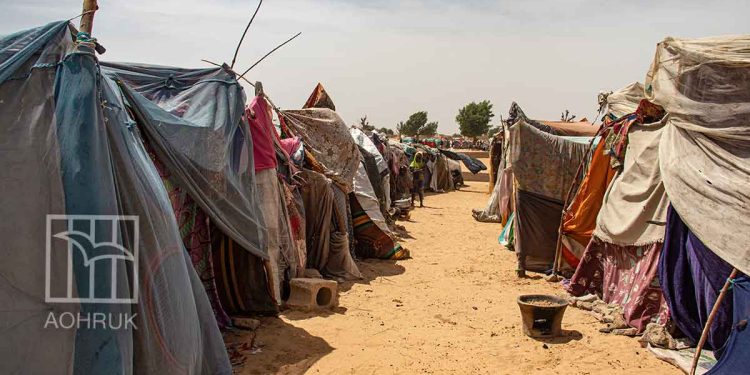El Fasher, the capital of North Darfur in western Sudan, has witnessed one of the gravest humanitarian disasters since the war erupted between the Sudanese Armed Forces and the Rapid Support Forces (RSF) in April 2023. A new wave of attacks has forced tens of thousands of civilians to flee in tragic circumstances.
According to estimates by the International Organization for Migration (IOM), 7,455 people fled the city in a single day due to ongoing clashes, bringing the total number of displaced individuals over three days to 33,485. This mass displacement highlights the deepening security and humanitarian collapse in El Fasher.
Widespread accusations have been directed at the RSF for committing field massacres, executing wounded civilians inside hospitals, and carrying out forced displacement and arbitrary detentions, acts that constitute war crimes and crimes against humanity under international law.
Local sources have described conditions inside the Saudi Hospital as a “silent massacre,” with injured patients reportedly killed while still clinging to life, an egregious violation of medical and humanitarian norms that mandate protection for the wounded, even during armed conflict.
These attacks are part of a broader, systematic strategy seen throughout the year-and-a-half-long war in Darfur, with the RSF using sieges, starvation, and raids as tools of control, deliberately destroying vital civilian infrastructure.
Before the war, El Fasher was home to nearly half a million people. Today, it has become nearly empty as hundreds of thousands have fled, evoking painful memories of the genocidal atrocities that ravaged Darfur in the early 2000s.
The violations in El Fasher represent a direct breach of the Geneva Conventions of 1949, particularly concerning the protection of civilians, the wounded, and medical facilities. Targeting hospitals and patients is a grave crime that does not expire, and large-scale forced displacement is classified under international law as a crime against humanity.
Despite mounting reports documenting these atrocities, international responses remain limited, mostly generic statements of condemnation, while the humanitarian collapse accelerates.
According to UN estimates, the conflict in Sudan has resulted in over 20,000 confirmed deaths and more than 15 million displaced people and refugees. Independent studies suggest the actual death toll could be as high as 130,000, making it one of the deadliest conflicts of the 21st century.
The international community’s silence regarding what’s happening in El Fasher, and Sudan more broadly, is not neutrality. It is complicity. Without the establishment of a genuine international accountability mechanism, Darfur is at risk of repeating its darkest chapters while the world looks the other way.


























